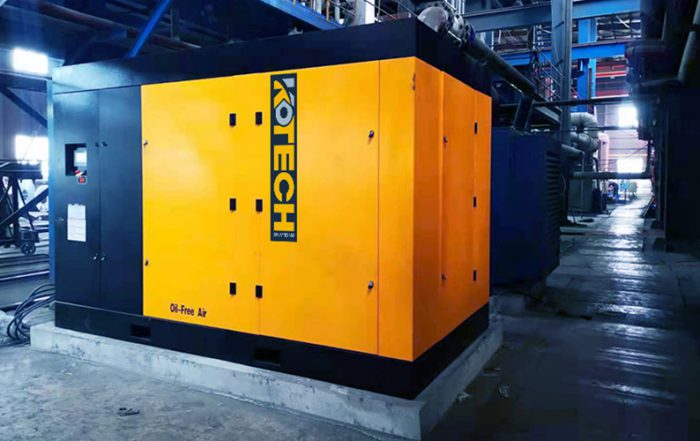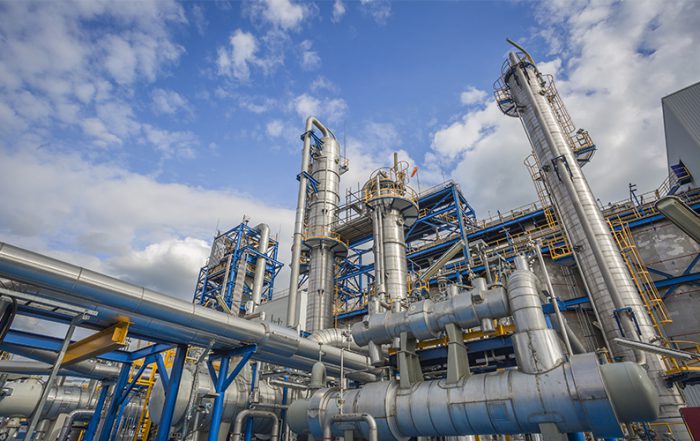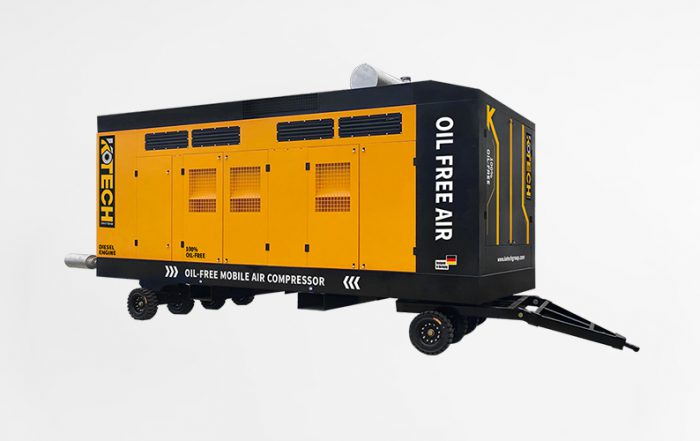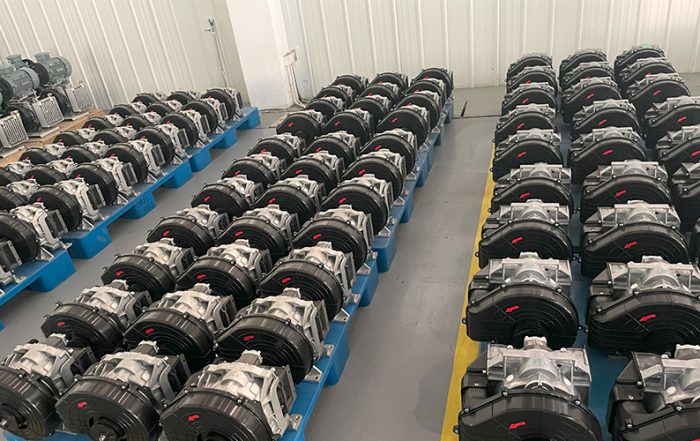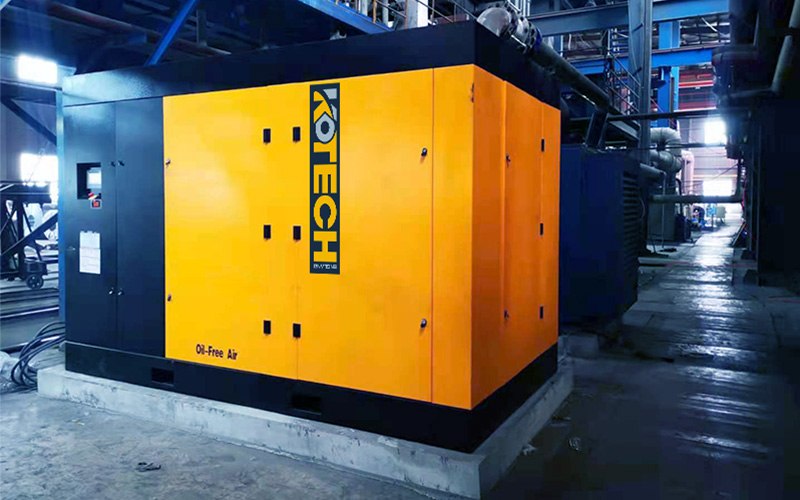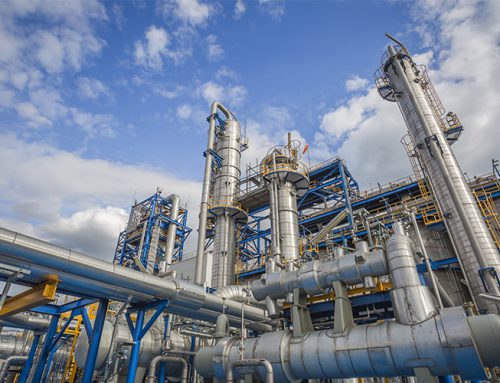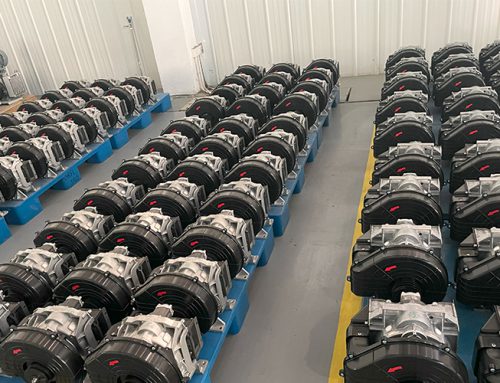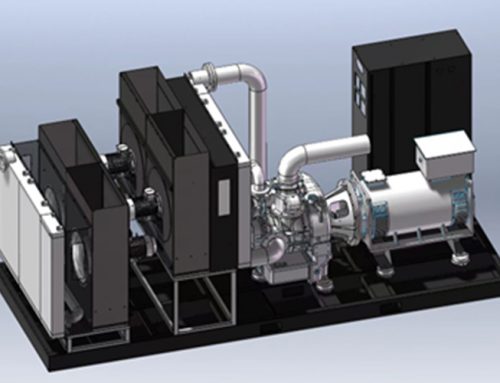What is the Working Principle of Oil-Free Screw Air Compressors, and Advantages and Disadvantages?
- 1 Introduction
- 1.1 Definition of Oil-Free Air Compressors
- 1.2 Applications of Oil-Free Air Compressors
- 1.3 Importance of Oil-Free Air Compressors
- 2 Basic Components of Oil-Free Air Compressors
- 3 Working Principle of Oil-Free Air Compressors
- 4 Key Technologies of Oil-Free Air Compressors
- 5 Advantages of Oil-Free Air Compressors
- 6 Application Cases of Oil-Free Air Compressors
- 6.1 Food and Beverage Industry
- 6.2 Medical and Pharmaceutical Industry
- 6.3 Electronics and Semiconductor Industry
- 6.4 Chemical Industry
- 6.5 Laboratories and Research Institutions
- 6.6 Automotive Manufacturing Industry
- 6.7 Textile Industry
- 6.8 Pharmaceutical Packaging Industry
- 6.9 Containerized Oil-Free Air Compressor Rental Services in the Energy Industry
- 7 Future Development Trends of Oil-Free Air Compressors
- 8 Conclusion
- 9 Appendix
1 Introduction
1.1 Definition of Oil-Free Air Compressors
An oil-free air compressor is a type of air compression equipment that does not use any lubricating oil during the air compression process. Traditional air compressors require lubricating oil during compression to reduce friction and cool the compressed air, but oil-free air compressors use special designs and technologies to completely avoid the use of lubricating oil. This not only ensures the purity of the compressed air, which contains no oil, but also reduces environmental pollution and simplifies maintenance.
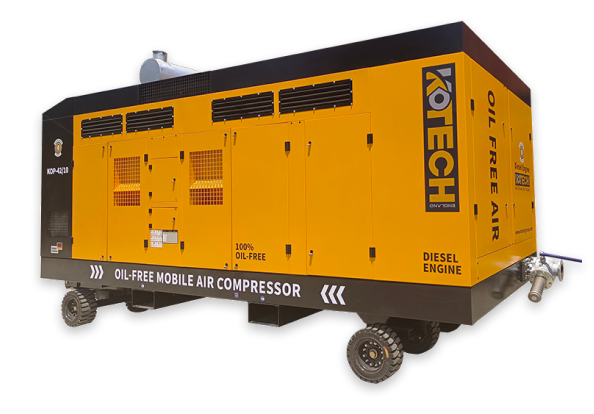
Oil-free air compressors typically use coating technology and high-precision machining to ensure efficient operation without lubricating oil. They are widely used in industries with high air quality requirements such as food, pharmaceuticals, and electronics, becoming essential equipment in these fields.
1.2 Applications of Oil-Free Air Compressors
Oil-free air compressors, with their clean, environmentally friendly, and efficient characteristics, are widely used in various industries:

- Food and Beverage Industry: Ensuring the production process meets food safety standards and avoiding oil contamination.
- Medical and Pharmaceutical Industry: Providing contamination-free compressed air, ensuring the safety of pharmaceutical production and medical procedures.
- Electronics and Semiconductor Industry: Preventing oil contamination of electronic components, ensuring the cleanliness of the production environment.
- Chemical Industry: Providing high-purity compressed air, preventing oil contamination during chemical reactions.
- Laboratories and Research Institutions: Ensuring the accuracy of experiments and analysis results.
- Automotive Manufacturing Industry: Preventing oil contamination during painting and assembly processes, improving product quality.
- Textile Industry: Preventing oil contamination during the production and processing of textiles.
- Pharmaceutical Packaging Industry: Ensuring the cleanliness of the packaging process, extending the shelf life of medicines.
Oil-free air compressors play a crucial role in these fields. Their characteristics of being pollution-free, efficient, and environmentally friendly enhance product quality and safety, promoting technological advancement and sustainable development across various industries.
1.3 Importance of Oil-Free Air Compressors
Oil-free air compressors hold significant importance in modern industry, mainly in the following aspects:
- Air Purity: Oil-free air compressors provide oil-free, pure compressed air, suitable for industries with high air quality requirements such as food, medical, and electronics.
- Environmental Protection and Energy Efficiency: By not using lubricating oil, oil-free air compressors reduce environmental pollution and their designs are usually more efficient, reducing energy consumption.
- Easy Maintenance: Oil-free air compressors do not require frequent oil changes, reducing maintenance workload and costs, and improving equipment efficiency and lifespan.
- Product Quality Assurance: During the production process, using oil-free air compressors can avoid oil contamination in compressed air, thereby improving the quality and safety of the final product.
Oil-free air compressors, by enhancing air purity, protecting the environment, simplifying maintenance, and ensuring product quality, have become indispensable equipment in many key industries, driving technological progress and sustainable industrial development.
2 Basic Components of Oil-Free Air Compressors
Oil-free air compressors ensure efficient operation without the use of lubricating oil through precise design and advanced technology. The following are the basic components of oil-free air compressors and their functions:

2.1 Main Unit (Compressor Unit)
The main unit is the core part of the oil-free air compressor, responsible for air intake, compression, and discharge. Due to the oil-free design, the interior of the main unit usually uses wear-resistant coatings or high-performance materials to reduce friction and wear, ensuring efficiency and reliability during long-term operation.
2.2 Motor
The motor provides power to the compressor unit. Oil-free air compressors typically use high-efficiency energy-saving motors to reduce energy consumption and improve operational efficiency. The design and selection of the motor directly affect the overall performance and lifespan of the compressor.
2.3 Control System
The control system includes electronic control units, sensors, and display panels. They work together to monitor and regulate the operating status of the compressor, ensuring the equipment operates under optimal conditions. The control system can monitor pressure, temperature, and operating time in real-time, and automatically shut down or alarm in case of abnormalities, protecting the equipment and the safety of operators.
2.4 Cooling System
The cooling system is an important part of the oil-free air compressor, used to dissipate the heat generated during compression. Cooling systems usually include air-cooling and water-cooling methods. Air-cooling systems dissipate heat through air flow, while water-cooling systems use water circulation for cooling. An effective cooling system can maintain stable operation of the equipment and prevent overheating.
2.5 Separation System
The separation system is responsible for removing impurities and moisture from the compressed air to ensure the purity of the output air. Oil-free air compressors often use high-efficiency filters and separators that can effectively remove particulates and water vapor from the air, ensuring the quality of the compressed air meets high standards.
2.6 Silencing System
The silencing system is used to reduce the noise generated during the operation of the compressor. It usually consists of silencers and soundproof enclosures, which can effectively reduce noise pollution and improve the comfort of the working environment. An efficient silencing system not only helps protect the hearing health of operators but also reduces the impact of noise on the surrounding environment.
2.7 Lubrication System (Special Design)
Although oil-free air compressors do not use traditional lubricating oil, some key parts still require a special lubrication system. Food-grade lubricants or self-lubricating materials are usually used to ensure necessary lubrication protection without contaminating the air.
2.8 Air Storage Tank
The air storage tank is a container used to store compressed air, ensuring a stable air supply during peak demand periods. It balances the air supply pressure, reduces the frequency of compressor starts, extends the equipment’s lifespan, and improves work efficiency.
The various components of oil-free air compressors work together to ensure efficient, stable, and reliable operation while providing high-purity compressed air. The design and optimization of these components directly determine the performance and application value of oil-free air compressors.
3 Working Principle of Oil-Free Air Compressors
Oil-free air compressors ensure efficient air compression without the use of lubricating oil through advanced design and technology. The following details the working principle of oil-free air compressors:
3.1 Compression Process
The compression process of an oil-free air compressor consists of three stages: intake, compression, and discharge:
3.1.1 Intake Stage
Air is drawn into the compressor chamber through the intake port. During the intake process, the intake valve opens, allowing air to enter the compression chamber. In oil-free air compressors, the intake air typically passes through a pre-filter to remove larger particles, ensuring that clean air enters the compression chamber.
3.1.2 Compression Stage
The drawn-in air is compressed within the compression chamber. Oil-free air compressors use special materials and coating technologies to ensure that the components within the compression chamber can operate under high pressure and temperature without the need for lubricating oil. Mechanical friction during the compression process is reduced through high-performance coatings and self-lubricating materials, ensuring the durability and efficiency of the equipment. The air temperature rises significantly during compression, at which point the cooling system activates to lower the air temperature, ensuring stable operation of the equipment.
3.1.3 Discharge Stage
The compressed air is discharged from the compression chamber through the discharge valve. The high-pressure air usually passes through a series of post-processing equipment, such as coolers and separators, to further reduce temperature and remove moisture and impurities, ultimately providing high-purity compressed air that meets usage requirements.
3.2 Oil-Free Design
The core of oil-free air compressors lies in their oil-free design, achieved through several key technologies:
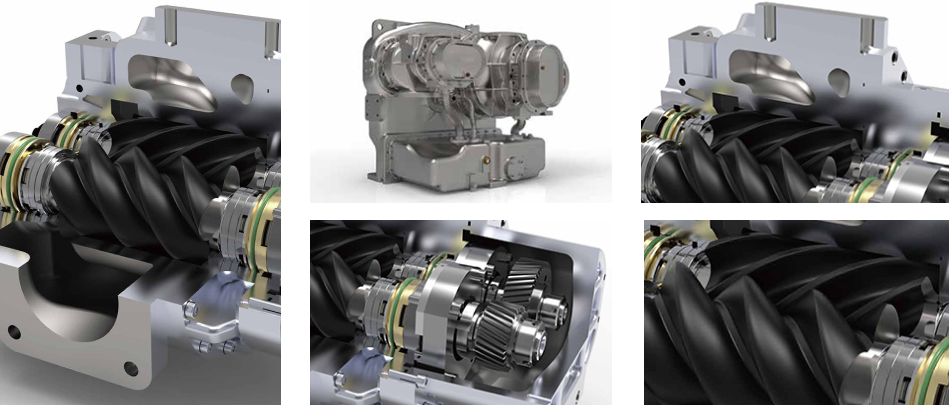
3.2.1 Coating Technology
UltraCoat™ Super Coating
UltraCoat™ is made from a specially designed MoS2 (molybdenum disulfide) composite material, forming a stronger chemical and mechanical adhesion on the rotor surface. This special design provides the precision and lubrication needed for the durability of the compressor screw rotors, maintaining good performance under high pressure and high temperature environments.
3.3 Cooling System
The cooling system plays a crucial role in oil-free air compressors, ensuring that the high-temperature air generated during compression is effectively cooled. Oil-free air compressors typically use air-cooling or water-cooling systems. Air-cooling systems use fans and radiators to dissipate heat, while water-cooling systems use water circulation to carry away heat. An effective cooling system not only improves compressor efficiency but also protects the equipment from high-temperature damage.
3.4 Separation and Filtration System
The separation and filtration system is used to remove impurities and moisture from the compressed air, ensuring the purity of the output air. Oil-free air compressors are equipped with high-efficiency separators and filters that can effectively remove oil mist, water vapor, and particulates from the air, providing clean air that meets high standards.
3.5 Control and Monitoring System
The control and monitoring system continuously monitors the operating status of the compressor, including parameters such as pressure, temperature, and operating time. Through electronic control units and sensors, the system can automatically adjust operating conditions, optimize compression efficiency, and automatically alarm or shut down in case of abnormalities, ensuring the safety and stability of the equipment.
Oil-free air compressors achieve efficient and stable operation without lubricating oil through precise design and multiple advanced technologies, providing high-quality compressed air to various industries and meeting stringent application requirements.
4 Key Technologies of Oil-Free Air Compressors
The efficient operation of oil-free air compressors relies on several key technologies that ensure the reliability and performance of the oil-free design. The following are some key technologies of oil-free air compressors:
4.1 Lubrication Materials and Coating Technology
4.1.1 Coating Technology
UltraCoat™ Super Coating
UltraCoat™ is made from a specially designed MoS2 (molybdenum disulfide) composite material, forming a stronger chemical and mechanical adhesion on the rotor surface. This special design provides the precision and lubrication needed for the durability of the compressor screw rotors, maintaining good performance under high pressure and high temperature environments. UltraCoat™ combined with a second-stage stainless steel rotor significantly enhances performance reliability and air quality, extending rotor life and operating time, and reducing energy costs.
4.2 Precision Machining and Assembly
Oil-free air compressors require highly precise coordination between components to reduce friction and wear, achieving efficient operation. Precision machining technology includes high-precision CNC machines, laser cutting, and EDM (electrical discharge machining), which can produce extremely fine components, ensuring surface smoothness and dimensional accuracy.
During assembly, high-precision assembly equipment and strict quality control processes are used to ensure that the gaps and fits between components meet design requirements, avoiding performance degradation and faults caused by assembly errors.
4.3 Control and Monitoring Technology
4.3.1 Electronic Control System
Modern oil-free air compressors are equipped with advanced electronic control systems that monitor and adjust the compressor’s operating status in real-time through electronic control units (ECUs) and various sensors. The control system can automatically adjust the compressor’s operating parameters, such as pressure, temperature, and operating speed, ensuring the equipment operates under optimal conditions, improving efficiency and energy-saving effects.
4.3.2 Remote Monitoring and Diagnostics
Some high-end oil-free air compressors also feature remote monitoring and diagnostic functions, allowing users to monitor the compressor’s operating status in real-time via the internet or a local area network and perform remote diagnostics and troubleshooting when abnormalities occur. This technology improves equipment reliability and maintenance efficiency, reducing downtime and maintenance costs.
4.4 Cooling and Heat Dissipation Technology
The cooling system is crucial in oil-free air compressors, effectively controlling the high temperatures generated during compression. Cooling systems mainly include air-cooling and water-cooling methods:
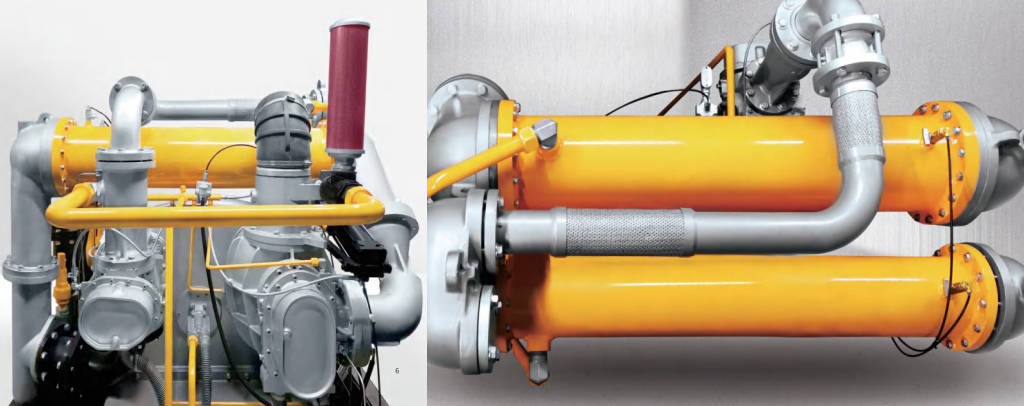
4.4.1 Air-Cooling System
The air-cooling system dissipates heat generated during compression through fans and radiators. The air-cooling system is simple in design and easy to maintain, suitable for most oil-free air compressors.
4.4.2 Water-Cooling System
The water-cooling system uses circulating cooling water to carry away heat, providing higher cooling efficiency, suitable for high-power, large-scale oil-free air compressors. The water-cooling system typically includes a cooling water pump, cooling tower, and heat exchanger, ensuring stable cooling effects in high-temperature environments.
4.5 Noise Reduction Technology
Oil-free air compressors generate some noise during operation. Advanced noise reduction technology can effectively reduce noise levels and improve the comfort of the working environment:
4.5.1 Silencers
Silencers are installed at the compressor’s exhaust and intake ports to absorb and block noise, reducing noise transmission. Efficient silencers use multi-layer soundproof materials and specially designed internal structures to significantly reduce noise levels.
4.5.2 Soundproof Enclosures
Soundproof enclosures cover the exterior of the compressor, isolating noise within the enclosure through multi-layer soundproof materials and sealed structures. The design of the soundproof enclosure not only considers noise isolation effects but also ensures the ventilation and cooling needs of the equipment, ensuring efficient operation of the compressor in a low-noise environment.
4.6 Corrosion Resistance and Anti-Oxidation Technology
Oil-free air compressors may come into contact with corrosive gases or liquids in certain application environments. Using corrosion resistance and anti-oxidation technologies can extend the equipment’s service life:
4.6.1 Material Selection
Selecting corrosion-resistant and anti-oxidation materials, such as stainless steel, aluminum alloy, and special alloys, to manufacture key components. These materials can maintain stable performance in corrosive environments, reducing equipment corrosion and aging.
4.6.2 Surface Treatment
Performing surface treatments on key components, such as anodizing, electroplating, and coating, to form protective layers that enhance corrosion resistance and anti-oxidation capabilities. These surface treatment technologies can significantly improve the durability and reliability of the components.
In summary, the key technologies of oil-free air compressors cover material selection, precision machining, control systems, cooling systems, noise reduction technologies, and corrosion resistance and anti-oxidation technologies. These technologies work together to ensure the efficient and reliable operation of oil-free air compressors in various application environments, meeting the needs of different users.
5 Advantages of Oil-Free Air Compressors
Oil-free air compressors are the preferred equipment in many industries due to their pollution-free, efficient, and environmentally friendly characteristics. The following are the main advantages of oil-free air compressors:
5.1 Environmental Protection and Energy Saving
5.1.1 No Oil Pollution
Oil-free air compressors do not use lubricating oil during the air compression process, completely eliminating oil pollution issues. This is beneficial for environmental protection and avoids the impact of oil in compressed air on production processes and final products, making it particularly suitable for industries with high air purity requirements such as food, medical, and electronics.
5.1.2 High Efficiency and Energy Saving
Oil-free air compressors typically use high-efficiency motors and optimized compressor structure designs, providing efficient compressed air output while reducing energy consumption. Additionally, the oil-free design reduces the use and replacement frequency of lubricating oil, further lowering operating costs and energy consumption.
5.2 Improved Purity of Compressed Air
The compressed air provided by oil-free air compressors contains no oil, meeting the high air purity requirements of various applications. For example, in food processing and packaging, using oil-free air compressors ensures that products are not contaminated by oil, improving product safety and quality. In electronics manufacturing, pure compressed air helps prevent component damage, ensuring product consistency and reliability.
5.3 Easy Maintenance
5.3.1 Reduced Maintenance Needs
Since oil-free air compressors do not use lubricating oil, the maintenance work for the oil circuit system is reduced. Traditional air compressors require regular replacement of lubricating oil and filters, whereas oil-free air compressors do not need these operations, reducing maintenance costs and workload.
5.3.2 Long Service Life
Oil-free air compressors use high-performance materials and advanced coating technologies to ensure stable long-term operation in an oil-free environment. High-quality components and precise manufacturing processes reduce wear and failure rates, extending the service life of the equipment.
5.4 Long Service Life
5.4.1 High-Quality Materials and Design
Oil-free air compressors use wear-resistant, durable materials and designs, such as high-performance polymers and ceramic coatings. These materials maintain stable performance in high-temperature, high-pressure environments, reducing wear and aging of mechanical components.
5.4.2 Advanced Technologies
Oil-free air compressors integrate advanced technologies such as precision machining, control and monitoring systems, and cooling and heat dissipation systems, ensuring reliability and efficiency during long-term operation. These technologies not only improve equipment performance but also extend its service life, reducing the total cost of ownership.
5.5 Increased Production Efficiency and Product Quality
5.5.1 Stable and Reliable Compressed Air Supply
Oil-free air compressors provide a stable and reliable supply of compressed air, avoiding production interruptions and product non-conformity caused by oil pollution. High-quality compressed air helps increase production efficiency and product quality, reducing scrap rates and rework costs.
5.5.2 Compliance with Strict Industry Standards
Many industries have strict requirements for air quality in the production process, such as medical, pharmaceutical, food, and electronics manufacturing. The pure compressed air provided by oil-free air compressors meets these high standards, ensuring that products comply with quality and safety standards.
5.6 Compliance with Environmental Regulations and Standards
5.6.1 Compliance with Environmental Regulations
With increasingly stringent environmental regulations, industries are demanding higher environmental performance from equipment. Oil-free air compressors, with their oil-free and low-energy consumption characteristics, meet various environmental regulations, helping companies reduce environmental pollution and carbon emissions.
5.6.2 Enhanced Corporate Image
Using oil-free air compressors not only helps companies comply with environmental standards but also enhances their environmental image and market competitiveness. More and more customers and consumers value corporate environmental responsibility, and choosing oil-free air compressors helps companies establish a green and environmentally friendly brand image.
In summary, oil-free air compressors are widely used in many industries due to their advantages such as environmental protection, energy saving, easy maintenance, long service life, improved production efficiency and product quality, and compliance with environmental regulations. These advantages make oil-free air compressors an indispensable important device in modern industry, providing strong support for the development and technological progress of various industries.
6 Application Cases of Oil-Free Air Compressors
Oil-free air compressors are widely used in many industries due to their clean, environmentally friendly, and efficient characteristics. The following are some major application fields:
6.1 Food and Beverage Industry
In the production process of food and beverages, compressed air is often used for packaging, filling, and handling. Due to the high food safety standards, any contaminants, including oil, can affect product quality and safety. Oil-free air compressors provide pure and pollution-free compressed air, ensuring that the production process complies with food safety regulations and avoiding the risk of oil contamination of products.
6.2 Medical and Pharmaceutical Industry
The medical and pharmaceutical industries have extremely high requirements for air quality, especially when producing medicines, medical devices, and performing surgeries. The oil-free compressed air provided by oil-free air compressors ensures the high purity of pharmaceutical production and prevents infections and other problems caused by air pollution during surgeries and other medical procedures. The use of oil-free air compressors helps maintain a sterile environment, ensuring patient safety and treatment effectiveness.
6.3 Electronics and Semiconductor Industry
In the production process of the electronics and semiconductor industry, strict requirements are imposed on particles and oil mist in the air. Tiny oil contaminants can cause damage or failure of electronic components. The clean air provided by oil-free air compressors effectively prevents this, ensuring the cleanliness of the production environment, thus improving product quality and reliability.
6.4 Chemical Industry
Many production processes in the chemical industry have strict requirements for the quality of compressed air, especially in stages involving reactions, transport, and separation. Oil-free air compressors provide high-purity compressed air, preventing oil contamination from interfering with chemical reactions, ensuring the purity and stability of chemical products. Additionally, the use of oil-free air compressors reduces maintenance needs and increases production efficiency.
6.5 Laboratories and Research Institutions
In laboratories and research institutions, many experiments require high-purity compressed air. For example, in gas chromatography analysis, using oil-free air compressors can avoid oil contamination that might affect the experimental results, ensuring the accuracy of analytical data. Furthermore, oil-free air compressors are widely used in various scientific equipment and instruments, providing reliable compressed air support.
6.6 Automotive Manufacturing Industry
In the automotive manufacturing process, compressed air is used for painting, assembly, and tool driving. Using oil-free air compressors can prevent oil contamination from affecting paint quality, ensuring the smoothness of the car surface and uniformity of the coating. Additionally, oil-free air compressors can enhance the lifespan and performance of assembly tools, reducing maintenance costs.
6.7 Textile Industry
In the textile industry, a large amount of compressed air is used in processes such as air-jet weaving, yarn cleaning, and equipment driving. Oil-free air compressors provide high-quality compressed air, preventing oil stains on textiles and ensuring the quality and production efficiency of textiles.
6.8 Pharmaceutical Packaging Industry
The pharmaceutical packaging industry requires high-purity compressed air for packaging and sealing medicines. Oil-free air compressors provide pollution-free compressed air, ensuring the cleanliness of the packaging process and preventing contamination of medicines, thereby extending the shelf life of the products.
6.9 Containerized Oil-Free Air Compressor Rental Services in the Energy Industry
Containerized oil-free air compressor rental services can be used directly outdoors for instrument air, pipeline purging, pressurization, air tightness, drying, and commissioning work. Due to the typically remote locations of air separation construction sites, inadequate facilities, and potential issues with the delivery, installation, and commissioning of self-purchased air compressors, renting an oil-free air compressor system can ingeniously solve these problems. It operates unaffected by wind, sand, or rain, with controllable temperatures, no need for a rain shelter, and ensures stable operation of the equipment at a very low cost, solving significant problems.
7 Future Development Trends of Oil-Free Air Compressors
As a key industrial equipment, the development trends of oil-free air compressors are driven by technological advancements, market demand, and regulatory policies. The following are the potential future development trends of oil-free air compressors:
7.1 Technological Innovation
7.1.1 Application of New Materials
In the future, oil-free air compressors will further adopt new high-performance materials such as nanomaterials and composite materials. These materials have superior wear resistance, corrosion resistance, and thermal stability, enabling efficient and stable operation in more demanding working environments.
7.1.2 Advanced Coating Technology
Advances in coating technology will significantly enhance the performance of oil-free air compressors. In the future, more types of coating materials and processes, such as superhard coatings and self-healing coatings, will further reduce friction and wear, improving the service life and reliability of the equipment.
7.1.3 Intelligent Control Systems
Intelligent control systems will become a focus of oil-free air compressor development. Through the Internet of Things (IoT) and Artificial Intelligence (AI) technologies, oil-free air compressors can achieve remote monitoring, fault prediction, and automated control, further improving operational efficiency and reliability while reducing manual intervention and maintenance costs.
7.2 Market Demand
7.2.1 Growth in Industry Demand
As various industries continue to raise their requirements for production processes and product quality, the demand for high-purity compressed air will continue to grow. Oil-free air compressors will be more widely used in food, medical, electronics, and chemical industries, and market demand will keep increasing.
7.2.2 Global Market Expansion
The market for oil-free air compressors will expand beyond developed countries. As the industrialization process accelerates in developing countries, the demand for oil-free air compressors in these regions will significantly increase. Manufacturers will expand their global markets, providing products and services that meet local needs.
7.3 Policies and Regulations
7.3.1 Stricter Environmental Regulations
Increasingly stringent global environmental regulations will drive companies to adopt more environmentally friendly and energy-efficient equipment. Due to their oil-free and low-energy characteristics, oil-free air compressors meet environmental regulatory requirements and will occupy an important position in the market.
7.3.2 Enhanced Industry Standards
Improved air quality standards in various industries will drive the development of oil-free air compressors. For example, the food and pharmaceutical industries have increasingly stringent standards for air quality, requiring the use of purer compressed air. Oil-free air compressors will meet these higher standards through technological advancements.
7.4 Energy Efficiency and Sustainable Development
7.4.1 Efficient Energy-Saving Design
Future oil-free air compressors will further optimize their design to improve energy utilization efficiency. Using high-efficiency motors, low-resistance airflow paths, and advanced control systems can significantly reduce energy consumption and improve overall energy-saving effects, meeting sustainable development needs.
7.4.2 Integration with Renewable Energy
Oil-free air compressors are expected to integrate with renewable energy technologies, such as solar and wind energy, to form more environmentally friendly energy supply solutions. This not only reduces carbon emissions but also lowers energy costs, promoting the development of green industries.
7.5 Maintenance and Services
7.5.1 Predictive Maintenance
Predictive maintenance based on big data and AI technologies will become a future trend. Through real-time monitoring and data analysis, it can predict equipment failures and maintenance needs in advance, reducing unplanned downtime and improving equipment reliability and lifespan.
7.5.2 Customized Services
As customer needs diversify, manufacturers will provide more customized service solutions. Tailored solutions covering equipment selection, installation, commissioning, and maintenance will be provided based on specific customer needs, improving customer satisfaction.
7.6 Environmental Protection and Sustainable Development
7.6.1 Eco-Friendly Design
Future designs of oil-free air compressors will focus more on environmental protection, using recyclable and biodegradable materials to reduce environmental impact. Additionally, optimizing design and production processes to reduce energy consumption and pollution emissions during manufacturing will be a priority.
7.6.2 Circular Economy
Manufacturers will gradually adopt the concept of a circular economy, promoting the recycling and remanufacturing of equipment. Establishing a comprehensive recycling system and remanufacturing processes will extend the lifecycle of equipment, reduce resource waste, and achieve sustainable development goals.
7.7 Research and Innovation
7.7.1 Increased R&D Investment
To maintain a leading position in technology, manufacturers will continuously increase R&D investment, promoting the application of new technologies, materials, and processes. Through research and innovation, they will continuously improve product performance and competitiveness to meet diverse market demands.
7.7.2 Collaboration and Alliances
In the future, there will be closer cooperation between manufacturers and with research institutions. Joint research and technology sharing will accelerate technological innovation and application promotion, jointly driving the development of the oil-free air compressor industry.
In summary, the future development trends of oil-free air compressors include technological innovation, market demand growth, policy and regulatory drivers, energy efficiency improvement, maintenance service optimization, and environmental protection and sustainable development. These trends will drive the widespread application of oil-free air compressors in various industries, continuously improving their performance and market competitiveness, and supporting the green transition and sustainable development of modern industries.
8 Conclusion
Oil-free air compressors have become indispensable in modern industries due to their pollution-free, efficient, energy-saving, and easy maintenance advantages. Technological advancements provide powerful momentum for the development of oil-free air compressors, continuously improving their performance and market competitiveness. As the global demand for high-purity compressed air increases and environmental regulations become increasingly stringent, the market prospects for oil-free air compressors will become broader, with tremendous potential for future development. Driven by both technological innovation and market demand, oil-free air compressors are poised for a more brilliant future, providing strong support for high-quality development and green transformation across various industries.
9 Appendix
9.1 Glossary of Terms
- Oil-Free Air Compressor: An air compressor that does not use any lubricating oil during the air compression process, achieving self-lubrication of mechanical components through special materials and design.
- Main Unit: The core component of the air compressor responsible for air intake, compression, and discharge.
- PTFE (Polytetrafluoroethylene): A high-performance polymer with excellent wear resistance and low friction coefficient, commonly used as a lubrication material in oil-free air compressors.
- Electronic Control Unit (ECU): A control system used to monitor and adjust the operating parameters of the air compressor in real-time, ensuring the equipment operates under optimal conditions.
- Air-Cooling System: A cooling system that dissipates heat through fans and radiators, suitable for most oil-free air compressors.
- Water-Cooling System: A cooling system that removes heat through circulating cooling water, suitable for high-power, large oil-free air compressors.
- Nanomaterials: Materials with particle sizes in the nanometer range (1-100 nanometers), exhibiting excellent mechanical properties and thermal stability.
- Coating Technology: A technology that applies a layer of high-performance material to the surface of mechanical components to enhance wear resistance, corrosion resistance, and self-lubrication properties.
- Intelligent Control System: A control system integrating IoT (Internet of Things) and AI (Artificial Intelligence) technologies to achieve remote monitoring, fault prediction, and automated control.
- Predictive Maintenance: A technology based on big data and AI that predicts equipment failures and maintenance needs in advance through real-time monitoring and data analysis.
- Environmental Regulations: Laws and regulations aimed at protecting the environment and reducing pollution, specifying the environmental performance requirements for industrial equipment.
- Circular Economy: An economic model centered on resource recycling, reducing resource waste through recycling and remanufacturing, and achieving sustainable development.
